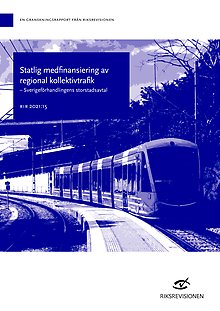Major shortcomings when central government invested billions in public transport in exchange for new housing
In the National Negotiation on Housing and Infrastructure, central government invested SEK 20 billion on regional public transport in exchange for increased housing construction. The Swedish National Audit Office (Swedish NAO) notes that the reference data for costs and the economy had major deficiencies and that the follow-up of the projects has been insufficient. In addition, new homes built as a result of the investments are probably few in number.

Photo: JENS LINDSTRÖM
The National Negotiation on Housing and Infrastructure resulted, among other things, in central government committing to co-finance major investments in the public transport of metropolitan areas in exchange for the municipalities promising to build new housing; the ‘metropolitan agreements’.
This differs from how the Riksdag has decided that infrastructure should be planned. The Swedish NAO has therefore audited whether, despite this, the Government has created the conditions for investments that as far as possible achieve the objectives determined by the Riksdag for the transport sector.
The audit shows, among other things, that the investigation and negotiation work was carried out under strong time pressure and that the necessary decision-support documentation and qualified cost analyses were not produced. It is also clear that the central government’s transparency and control during implementation is inadequate.
Instead of examining which projects were of most public economic benefit, and would best solve the existing transport needs, the National Negotiation on Housing and Infrastructure prioritised expensive projects in exchange for new housing.
The deficiencies in the documentation and the absence of generally accepted quality assurance by the Swedish Transport Administration and the Swedish Agency for Transport Policy Analysis resulted in greater risks of increased cost, which has also occurred in several cases.
“When central government makes major investments in infrastructure, economic benefit to society must be an important premise for priority. The enabling conditions for this were poor in the National Negotiation on Housing and Infrastructure’s work on the metropolitan agreements," says Auditor General Helena Lindberg.
The Swedish NAO considers that the shortcomings are largely explained by the planning model, where investments were largely decided based on how many new homes were promised rather than on the economic benefit to society of the infrastructure investments.
There is a great risk that the projects chosen have displaced investments that would have given more public transport for the money. This is contrary to the transport policy objectives, but could possibly be justified if they instead contributed more to housing policy objectives. However, the Government did not provide guidance on how the conflict of objectives should be balanced.
The National Negotiation on Housing and Infrastructure has reported that the metropolitan agreements resulted in about 200,000 new homes. The Swedish NAO’s assessment is that the agreements may indeed have accelerated housing construction somewhat, but that the net addition of new housing that they have led to in practice is significantly less.
“In many cases, municipalities were already planning major construction of new homes, and these plans were probably not affected to any great extent. In many cases, the new homes depend on infrastructure improvements, but not necessarily the ones that were then decided," says Martin Hill, project leader for the audit.
Recommendations
The Swedish NAO recommends that the Government, when negotiating co-financing of regional public transport measures, does the following:
- Ensure that prioritisation of measures is based on analyses of needs, transparent and comparable cost-benefit analyses and reliable cost estimates.
- Ensure that priority based on transport policy objectives is the main premise. If a negotiation entails a risk of departure from the transport policy objectives, this should be clearly explained.
- Ensure that after the decision on co-financing is taken, the central government has good insight and control during the implementation of the measures decided.
The National Negotiation on Housing and Infrastructure
The National Negotiation on Housing and Infrastructure was an inquiry that negotiated, among other things, the expansion of new main lines for high-speed trains, housing, the eastern link in Stockholm and the metropolitan agreements on co-financing of public transport measures in Stockholm, Gothenburg and Malmö. The inquiry ran from 2014 to 2017. The part of the National Negotiation on Housing and Infrastructure that is called the metropolitan agreements meant that in exchange for a commitment by the municipalities in the three metropolitan regions to build about 200,000 new homes, central government contributed about SEK 20 billion to the expansion of regional public transport.
Press contact: Olle Castelius, phone: +46 8-5171 40 04.
Presskontakt: Olle Castelius , telefon: 08-5171 42 06.
Share in social media and by e-mail
Contact form
Send your questions or comments via the form below and we will make sure that they reach the right member of staff. Please state if your question concerns the information on this particular page.


